名词性从句引导词细辨
名词性从句与宾语从句的引导词

名词性从句与宾语从句的引导词名词性从句和宾语从句都是英语语法中的重要部分,它们由引导词引导,用来充当名词的作用。
本文将详细介绍名词性从句和宾语从句的引导词及其用法。
一、名词性从句的引导词名词性从句是指在句子中扮演名词角色的从句。
常见的名词性从句引导词包括:that, whether/if, what, whoever, whomever, whichever, whose等。
1. 连词that连词that用来引导主语从句、宾语从句和表语从句,常见用法如下:- 主语从句:That he is coming is good news.- 宾语从句:She said that she would come.- 表语从句:The fact that he passed the exam pleased his parents.2. 连词whether/if连词whether和if都可以引导主语从句、宾语从句和表语从句,两者可以互换使用。
常见用法如下:- 主语从句:Whether he will come or not is uncertain.- 宾语从句:I don't know whether/if she is happy or not.- 表语从句:The question is whether/if we should go or stay.3. 疑问词what疑问词what用来引导主语从句、宾语从句和表语从句,常见用法如下:- 主语从句:What he said is important.- 宾语从句:I don't know what he wants.- 表语从句:Her job is what she loves.4. 关系代词whoever/whomever/whichever/whose关系代词whoever/whomever/whichever/whose分别用来引导主语从句、宾语从句和表语从句,常见用法如下:- 主语从句:Whoever comes first will get a prize.- 宾语从句:I will give it to whomever needs it.- 表语从句:Whose decision it is remains unknown.二、宾语从句的引导词宾语从句是指在句子中充当宾语角色的从句。
名词性从句的引导词和用法

名词性从句的引导词和用法名词性从句是指在句子中充当名词的从句,它可以在句子中作主语、宾语、表语、同位语等成分。
在构建名词性从句时,需要使用特定的引导词来引导从句的内容。
本文将详细介绍名词性从句的引导词及其用法。
一、引导名词性从句的词语1. 从属连词从属连词是引导名词性从句最常用的一类词语。
常见的从属连词有:(1)连接主语从句的引导词:that, whether, if等例如:- He said that he would come to the party.- I wonder whether/if it will rain tomorrow.(2)连接宾语从句的引导词:that, whether, if, what等例如:- She asked me what my favorite color was.- We don't know if/whether he will pass the exam.(3)连接表语从句的引导词:that, whether, if等例如:- My belief is that honesty is the best policy.- The question is whether/if he can handle the job.(4)连接同位语从句的引导词:that, whether, if等例如:- The fact that she won the competition surprised everyone.- There is no doubt whether/if he will achieve his goal.2. 连接副词有些副词也可以用来引导名词性从句,常见的有:where, when, why, how等。
例如:- I don't know where he went after the meeting.- Can you tell me when the train will arrive?二、名词性从句的用法1. 主语从句主语从句常常出现在句子的主语位置,用来说明句子的主语是谁。
名词性从句的引导词和用法
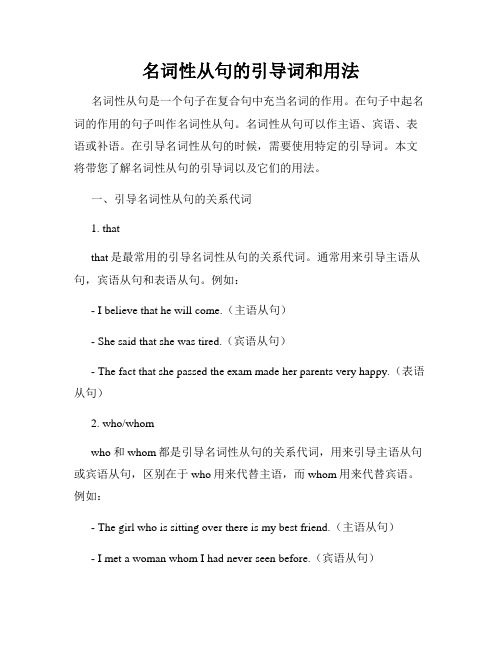
名词性从句的引导词和用法名词性从句是一个句子在复合句中充当名词的作用。
在句子中起名词的作用的句子叫作名词性从句。
名词性从句可以作主语、宾语、表语或补语。
在引导名词性从句的时候,需要使用特定的引导词。
本文将带您了解名词性从句的引导词以及它们的用法。
一、引导名词性从句的关系代词1. thatthat是最常用的引导名词性从句的关系代词。
通常用来引导主语从句,宾语从句和表语从句。
例如:- I believe that he will come.(主语从句)- She said that she was tired.(宾语从句)- The fact that she passed the exam made her parents very happy.(表语从句)2. who/whomwho和whom都是引导名词性从句的关系代词,用来引导主语从句或宾语从句,区别在于who用来代替主语,而whom用来代替宾语。
例如:- The girl who is sitting over there is my best friend.(主语从句)- I met a woman whom I had never seen before.(宾语从句)3. whichwhich通常用来引导主语从句或宾语从句,代替物,用来描述事物和非人称的动物。
例如:- The book which is on the table is mine.(主语从句)- She bought a new car, which made her very happy.(宾语从句)4. whosewhose用来引导名词性从句,表示所属关系。
通常用来引导主语从句或宾语从句。
例如:- The man whose car was stolen reported it to the police.(主语从句)- The boy whose sister is a singer is very proud of her.(宾语从句)5. whomwhom用来引导宾语从句,代替人。
名词性从句的引导词总结

名词性从句的引导词总结名词性从句是英语语法中的重要部分,它可以在句子中作主语、宾语、表语等成分,起到连接主句和从句的作用。
在引导名词性从句时,我们需要使用特定的引导词。
本文将总结各种名词性从句的引导词,并对其用法进行详细说明。
一、作主语的引导词1. That:常用于表达具体事实、真理或观点。
例如:- That he is a talented singer is widely known.众所周知,他是一个有才华的歌手。
2. Whether:用于引导一个选择性从句。
例如:- Whether he will come or not remains uncertain.他是否会来仍然不确定。
3. If:同样用于引导一个选择性从句,常用于陈述句中。
例如:- If it rains, we will stay indoors.如果下雨的话,我们会呆在室内。
二、作宾语的引导词1. That:常用于表示陈述、命令、建议等。
例如:- She believes that he is innocent.她相信他是无辜的。
2. Whether:用于引导宾语从句,表示选择或疑问。
例如: - I'm still not sure whether he likes me or not.我仍然不确定他是否喜欢我。
3. If:常用于引导有关条件的名词性从句。
例如:- He asked if she could lend him some money.他问她是否能借他一些钱。
三、作表语的引导词1. That:常用于表示事实、观点等。
例如:- The problem is that we don't have enough time.问题是我们没有足够时间。
2. Whether:常用于表示选择或疑问。
例如:- The question is whether we should go by car or by train.问题是我们应该坐车还是坐火车。
名词性从句的引导词及结构

名词性从句的引导词及结构名词性从句是指在句中充当名词的从句。
它可以担任主语、宾语、表语、同位语等句子成分的功能。
在语法上,名词性从句由引导词引导,并有特定的结构。
本文将讨论名词性从句的引导词及结构。
一、名词性从句的引导词1. 连接代词连接代词在名词性从句中充当连词,并引导从句的开头。
常见的连接代词有:(1)that:在宾语从句中起引导作用,常用于陈述句和命令句。
例句:He said that he would come tomorrow.(他说他明天会来。
)(2)whether:在宾语从句中可引导直接引语或间接引语;同时,也用于表语从句、同位语从句和主语从句中。
例句:I don't know whether he will come tomorrow.(我不知道他明天是否会来。
)(3)who:在主语从句中引导作用,指人。
例句:Who will be the next president is still uncertain.(谁将成为下一任总统仍然不确定。
)2. 连接副词连接副词在名词性从句中充当连词,引导从句的开头。
常见的连接副词有:(1)why:在宾语从句和表语从句中起引导作用。
例句:I don't understand why he did that.(我不明白他为什么那样做。
)(2)when:在宾语从句中引导时间状语从句。
例句:I can't remember when he arrived.(我记不清他是什么时候到达的。
)(3)where:在宾语从句中引导地点状语从句。
例句:Please tell me where you live.(请告诉我你住在哪里。
)二、名词性从句的结构名词性从句的结构要根据引导词和主句之间的关系进行变化。
根据从句在句子中所充当的句子成分,名词性从句可以分为以下几种类型。
1. 主语从句主语从句在句子中充当主语的角色,常用引导词有that、whether和连接代词who、what等。
语法重点回顾名词性从句的引导词

语法重点回顾名词性从句的引导词名词性从句是指在句子中充当名词的从句,它可以作主语、宾语、表语、定语等成分。
在名词性从句中,引导词起着连接从句和主句的作用。
本文将重点回顾名词性从句中的引导词。
引导名词性从句的常见引导词有:that, if/whether, what, who, whom, whose, which, when, where, why等。
下面我们将逐个介绍这些引导词在名词性从句中的用法。
1. that:- 用作连接代词,引导主语从句、宾语从句、表语从句、定语从句等。
- 例如:I believe that he can succeed.(主语从句)She knows that he is lying.(宾语从句)The fact that he failed surprised me.(表语从句)The book that I bought yesterday is very interesting.(定语从句)2. if/whether:- 用于引导主语从句和宾语从句。
- 例如:Whether he will come or not depends on the weather.(主语从句)I don't know if he can make it on time.(宾语从句)3. what:- 用于引导主语从句和宾语从句。
- 例如:What she said made me disappointed.(主语从句)I don't understand what you mean.(宾语从句)4. who/whom:- who用于引导主语从句,whom用于引导宾语从句。
- 例如:Who will be responsible for this project has not been decided yet.(主语从句)I don't know whom he's talking to on the phone.(宾语从句)5. whose:- 用于引导定语从句,表示所属关系。
语法中的名词性从句的引导词和用法
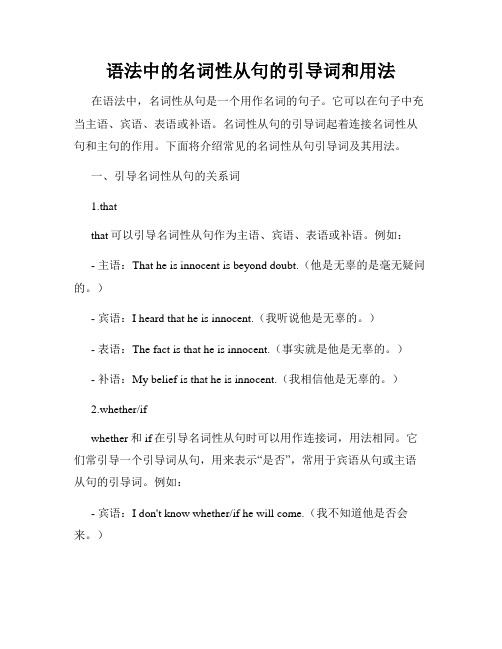
语法中的名词性从句的引导词和用法在语法中,名词性从句是一个用作名词的句子。
它可以在句子中充当主语、宾语、表语或补语。
名词性从句的引导词起着连接名词性从句和主句的作用。
下面将介绍常见的名词性从句引导词及其用法。
一、引导名词性从句的关系词1.thatthat可以引导名词性从句作为主语、宾语、表语或补语。
例如:- 主语:That he is innocent is beyond doubt.(他是无辜的是毫无疑问的。
)- 宾语:I heard that he is innocent.(我听说他是无辜的。
)- 表语:The fact is that he is innocent.(事实就是他是无辜的。
)- 补语:My belief is that he is innocent.(我相信他是无辜的。
)2.whether/ifwhether和if在引导名词性从句时可以用作连接词,用法相同。
它们常引导一个引导词从句,用来表示“是否”,常用于宾语从句或主语从句的引导词。
例如:- 宾语:I don't know whether/if he will come.(我不知道他是否会来。
)- 主语:Whether/If it will rain tomorrow is uncertain.(明天是否会下雨还不确定。
)3.whowho可引导主语从句、宾语从句或表语从句。
它用来指代人。
例如:- 主语:Who will win the game is still unknown.(谁将获胜还不知道。
)- 宾语:I don't know who he is.(我不知道他是谁。
)- 表语:The winner depends on who plays better.(胜利者取决于谁打得更好。
)4.whatwhat可以引导主语从句、宾语从句或表语从句。
它用来指代事物或事实。
例如:- 主语:What she said surprised me.(她说的话让我感到惊讶。
名词性从句引导词细辨
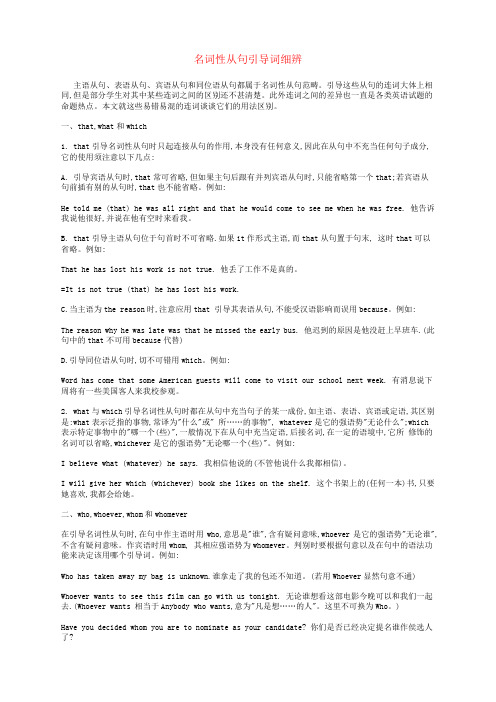
名词性从句引导词细辨主语从句、表语从句、宾语从句和同位语从句都属于名词性从句范畴。
引导这些从句的连词大体上相同,但是部分学生对其中某些连词之间的区别还不甚清楚。
此外连词之间的差异也一直是各类英语试题的命题热点。
本文就这些易错易混的连词谈谈它们的用法区别。
一、that,what和which1. that引导名词性从句时只起连接从句的作用,本身没有任何意义,因此在从句中不充当任何句子成分,它的使用须注意以下几点:A. 引导宾语从句时,that常可省略,但如果主句后跟有并列宾语从句时,只能省略第一个that;若宾语从句前插有别的从句时,that也不能省略。
例如:He told me (that) he was all right and that he would come to see me when he was free. 他告诉我说他很好,并说在他有空时来看我。
B. that引导主语从句位于句首时不可省略.如果it作形式主语,而that从句置于句末, 这时that可以省略。
例如:That he has lost his work is not true. 他丢了工作不是真的。
=It is not true (that) he has lost his work.C.当主语为the reason时,注意应用that 引导其表语从句,不能受汉语影响而误用because。
例如:The reason why he was late was that he missed the early bus. 他迟到的原因是他没赶上早班车.(此句中的that不可用because代替)D.引导同位语从句时,切不可错用which。
例如:Word has come that some American guests will come to visit our school next week. 有消息说下周将有一些美国客人来我校参观。
初中英语知识点归纳名词性从句的引导词和结构

初中英语知识点归纳名词性从句的引导词和结构名词性从句是英语语法中的一个重要概念,它可以在句子中作主语、宾语、表语或补语等成分。
在名词性从句中,引导词起着引导作用,决定了从句的结构和意义。
本文将对名词性从句中的引导词和结构进行归纳总结。
一、名词性从句的引导词1. 连词 that在许多情况下,名词性从句可以由连词“that”引导。
例如:- I know that he is a good student.(我知道他是一个好学生。
)这里,“that he is a good student”是由“that”引导的名词性从句,在句中作宾语。
2. 连词 if/whether名词性从句还可以由连词“if”或“whether”引导,用于引导间接疑问句等情况。
例如:- I wonder if/whether he will come to the party.(我想知道他是否会来参加聚会。
)这里,“if/whether he will come to the party”是由“if/whether”引导的名词性从句,在句中作宾语。
3. 连词 who/whom/whose/which/what除了“that”和“if/whether”,名词性从句还可以由其他疑问词引导。
例如:- Who is responsible for the accident?(谁对这起事故负责?)这里,“Who is responsible for the accident”是由“Who”引导的名词性从句,在句中作主语。
4. 连词 when/where/why/how名词性从句还可以由疑问副词引导。
例如:- I still remember when we first met.(我仍然记得我们初次见面的时候。
)这里,“when we first met”是由“when”引导的名词性从句,在句中作宾语。
二、名词性从句的结构1. 主语从句名词性从句可以出现在主语的位置。
名词性从句的引导词和结构

名词性从句的引导词和结构名词性从句是由一个从属连词引导的从句,能够在句中充当名词的成分。
它可以作主语、宾语、表语、同位语等,用来表示具体的事物、概念、状态或假设等。
在英语中,常用的引导名词性从句的引导词有that、whether和连接代词who、whom、whose、which和what等。
本文将详细介绍名词性从句的引导词和结构。
1. 引导词that:名词性从句中最常用的引导词是that。
它通常用来引导主语从句、宾语从句、表语从句和同位语从句。
主语从句:That everyone should contribute to environmental protection is essential.宾语从句:She believes that education is the key to success.表语从句:The truth is that he is not interested in the project.同位语从句:The fact that she won the competition surprised everyone.2. 引导词whether:引导词whether用于引导一般疑问句和选择疑问句,表示两种或多种可能性。
一般疑问句:Whether he will come to the meeting is still uncertain.选择疑问句:I can't decide whether to go to the party or stay at home.3. 连接代词who、whom、whose:连接代词who、whom和whose分别用来引导主语从句、宾语从句和定语从句,表示人或具有人的性质的事物。
主语从句:Who will be responsible for the project has not been decided yet.宾语从句:I don't know whom she invited to the party.定语从句:The girl whose parents are both doctors wants to become a doctor too.4. 连接代词which:连接代词which用来引导主语从句、宾语从句和定语从句,表示事物或具有事物的性质的人。
高中英语知识点归纳名词性从句的引导词

高中英语知识点归纳名词性从句的引导词在高中英语学习中,名词性从句是一个重要的知识点。
名词性从句在句子中充当名词的角色,可以作主语、宾语、表语或同位语。
在引导名词性从句的句子中,我们通常使用一些特定的词语来引导,这些词语被称为从句的引导词。
本文将对名词性从句的引导词进行归纳总结。
一、引导名词性从句的关系代词1. 关系代词"that":在名词性从句中,"that"可以引导主语从句、宾语从句、表语从句和同位语从句。
例如:- 主语从句:That he succeeded surprised us all.(他成功了让我们都感到惊讶)- 宾语从句:I know that you are busy.(我知道你很忙)- 表语从句:The problem is that he is always late.(问题是他总是迟到)- 同位语从句:The fact that she failed the exam made her sad.(她考试没通过的事实让她很伤心)2. 关系代词"who/whom":用于引导限定性从句中的人作主语或宾语。
例如:- 作主语:The person who called me yesterday was my teacher.(昨天给我打电话的人是我的老师)- 作宾语:The boy whom I met at the party is my cousin.(我在派对上遇见的男孩是我的堂兄)3. 关系代词"which":用于引导限定性从句中的物作主语或宾语。
例如:- 作主语:The book which is on the table is mine.(在桌子上的那本书是我的)- 作宾语:I bought the watch which he recommended.(我买了他推荐的那块手表)4. 关系代词"whose":用于引导限定性从句中表示所属关系的从句。
高中语法解析名词性从句的引导词
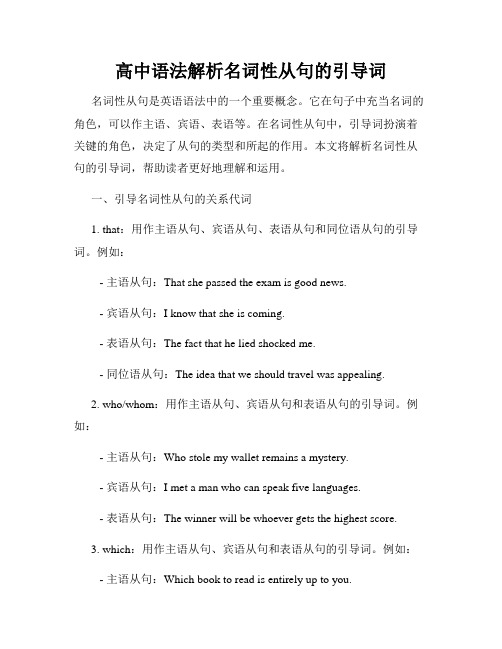
高中语法解析名词性从句的引导词名词性从句是英语语法中的一个重要概念。
它在句子中充当名词的角色,可以作主语、宾语、表语等。
在名词性从句中,引导词扮演着关键的角色,决定了从句的类型和所起的作用。
本文将解析名词性从句的引导词,帮助读者更好地理解和运用。
一、引导名词性从句的关系代词1. that:用作主语从句、宾语从句、表语从句和同位语从句的引导词。
例如:- 主语从句:That she passed the exam is good news.- 宾语从句:I know that she is coming.- 表语从句:The fact that he lied shocked me.- 同位语从句:The idea that we should travel was appealing.2. who/whom:用作主语从句、宾语从句和表语从句的引导词。
例如:- 主语从句:Who stole my wallet remains a mystery.- 宾语从句:I met a man who can speak five languages.- 表语从句:The winner will be whoever gets the highest score.3. which:用作主语从句、宾语从句和表语从句的引导词。
例如:- 主语从句:Which book to read is entirely up to you.- 宾语从句:I bought a new laptop, which I use for work.- 表语从句:The problem is which route to take.二、引导名词性从句的连接副词1. why:用作主语从句的引导词。
例如:- Why he said that is still unclear.2. how:用作主语从句的引导词。
例如:- How she managed to finish the project on time remains a mystery.三、引导名词性从句的连接词1. whether:用作主语从句、宾语从句和表语从句的引导词。
名词性从句的引导词及其用法

名词性从句的引导词及其用法名词性从句是指在句子中充当名词的从句,它可以担任主语、宾语、表语、同位语等语法成分。
而引导名词性从句的词语被称为名词性从句的引导词。
在英语中,常见的名词性从句的引导词有:that,whether/if, who, whom, whose, which, what, when, where, why等。
以下将详细介绍这些引导词及其用法。
1. that在名词性从句中,that可以引导主语从句、宾语从句以及表语从句。
例如:- It is important that you study hard.(主语从句)- She told me that she would come.(宾语从句)- The fact that he failed surprised us.(表语从句)2. whether/ifWhether和if在名词性从句中可以互换使用,都可以引导主语从句以及宾语从句。
例如:- Whether/if he will come is still unknown.(主语从句)- I am not sure whether/if she has finished her work.(宾语从句)3. who/whom/whose这些词用于引导名词性从句时,分别表示人的关系,who引导主语从句,whom引导宾语从句,whose引导定语从句。
例如: - Who told you the news?(主语从句)- Whom did you invite to the party?(宾语从句)- Do you know the girl whose dog won the competition?(定语从句)4. whichWhich通常用来引导主语从句、宾语从句以及非限制性定语从句。
例如:- Which book do you prefer?(主语从句)- She didn't know which answer was correct.(宾语从句)- The car, which was parked outside, belonged to the new neighbor.(非限制性定语从句)5. whatWhat可以引导主语从句、宾语从句,也可用于特殊疑问词“什么”的形式。
初中英语知识点归纳名词性从句的分类和引导词

初中英语知识点归纳名词性从句的分类和引导词名词性从句是英语语法中的一个重要部分,它在句子中起到名词的作用。
在初中英语中,名词性从句主要包括主语从句、宾语从句、表语从句和同位语从句。
本文将对这四种名词性从句的分类和引导词进行详细的归纳和总结。
一、主语从句主语从句在句中作主语,常常用来引导主语从句的引导词有:that, whether, who, whom, what, which, whoever, whatever, whichever等。
1. 引导词“that”该引导词常用于陈述句,如:- That he is a good student is well known to everyone.(他是个好学生这一点是众所周知的。
)- That we should protect the environment is of great importance.(保护环境非常重要。
)2. 引导词“whether”该引导词常用于一般疑问句和特殊疑问句中,如:- Whether he will come to the party or not is still uncertain.(他是否会来参加派对还不确定。
)- I don't know whether he is telling the truth.(我不知道他是否说的是真话。
)3. 引导词“who, whom”这两个引导词常用于主语从句中表示人,who作为主语,whom作为宾语,如:- Who will take care of the baby is not yet decided.(谁来照顾这个婴儿还没有确定。
)- Whom he loves is none of our business.(他爱谁与我们无关。
)4. 引导词“what”该引导词常用于主语从句中表示事物,如:- What makes him happy is playing basketball.(使他快乐的是打篮球。
小学六年级重要知识归纳名词性从句的引导词总结

小学六年级重要知识归纳名词性从句的引导词总结名词性从句是指可以在句中担当名词成分的从句,它可以作主语、宾语、表语、同位语等。
根据从句在句中的不同作用,引导名词性从句的引导词也会有所不同。
下面是对于小学六年级重要知识归纳名词性从句的引导词的总结。
引导主语从句的引导词:1. that: 用来引导陈述句作主语从句。
例如:That he is late for school every day bothers his teacher.引导宾语从句的引导词:1. that: 用来引导陈述句作宾语从句。
例如:He said that he would go to the park with his friends tomorrow.2. if/whether: 常用来引导一般疑问句或选择疑问句作宾语从句。
例如:I don't know if/whether she can come to the party.引导表语从句的引导词:1. that: 用来引导陈述句作表语从句。
例如:The fact that he won the competition surprised everyone.引导同位语从句的引导词:1. what: 用来引导陈述句作宾语从句。
例如:I don't understand what you mean.2. whether/if: 常用来引导一般疑问句或选择疑问句作同位语从句。
例如:She is unsure whether/if she will pass the test.除了上述常见的引导词外,还有一些其他的引导词用于引导名词性从句:1. who/whom: 用来引导人称从句。
例如:I don't know who is coming to the party.2. whose: 用来引导名词性从句表示所属关系。
例如:I don't know whose book this is.3. which: 用来引导名词性从句表示选择。
名词性从句引导词细辨

名词性从句引导词细辨现在分词与过去分词都具有作定语、表语、状语、补语等功能。
不管作何句子成分,几乎所有动词的分词形式都与句中某一成分(名词代词或前文的整个句子)存在逻辑上的主谓关系或动宾关系:现在分词与该成分存在逻辑上的主谓关系;及物动词的过去分词与该成分存在逻辑上的动宾关系,表示被动和完成。
一.分词作定语,与被修饰的词存在逻辑主谓或动宾关系。
例如:1. Prices of daily goods bought through a computer can be lower than store prices. (句中bought与goods存在着明显的逻辑动宾关系。
)2. The manager, knowing his factory`s products were poor in quality, decided to give his workers further training. (句中manager与knowing存在着逻辑上的主谓关系。
)二.分词作表语,与主语存在逻辑主谓或动宾关系。
例如:1.It`s encouraging to hear that the computer has won the game.(句中it 指代后面的动词不定式,与encouraging之间存在着逻辑上的主谓关系。
)2.You should not touch an electric wire when it is broken.(broken与主语it存在着逻辑上的动宾关系。
)三.作状语的分词,通常与句子主语形成逻辑上的主谓或动宾关系。
例如:1. Civen time, he`ll make a first-class tennis player.(Given与主语he存在着逻辑上的动宾关系,相当于条件状语从句“If he is given”。
)2. He sent me an e-mail, hoping to get further information..(句子主语He与hoping之间存在着逻辑上的主谓关系。
名词性从句的引导词引导主语或宾语从句
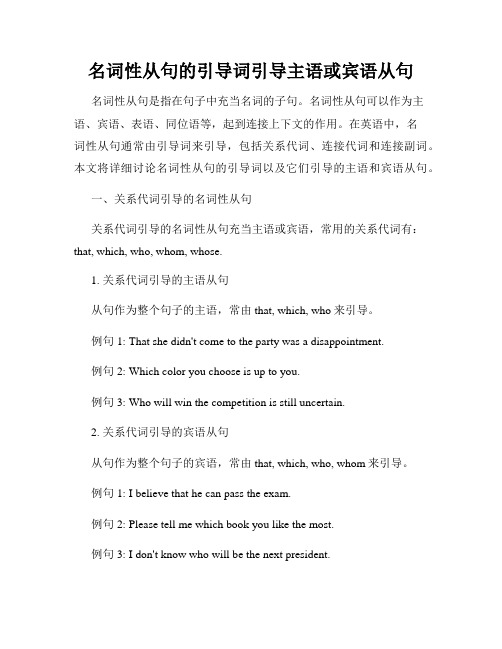
名词性从句的引导词引导主语或宾语从句名词性从句是指在句子中充当名词的子句。
名词性从句可以作为主语、宾语、表语、同位语等,起到连接上下文的作用。
在英语中,名词性从句通常由引导词来引导,包括关系代词、连接代词和连接副词。
本文将详细讨论名词性从句的引导词以及它们引导的主语和宾语从句。
一、关系代词引导的名词性从句关系代词引导的名词性从句充当主语或宾语,常用的关系代词有:that, which, who, whom, whose.1. 关系代词引导的主语从句从句作为整个句子的主语,常由that, which, who来引导。
例句1: That she didn't come to the party was a disappointment.例句2: Which color you choose is up to you.例句3: Who will win the competition is still uncertain.2. 关系代词引导的宾语从句从句作为整个句子的宾语,常由that, which, who, whom来引导。
例句1: I believe that he can pass the exam.例句2: Please tell me which book you like the most.例句3: I don't know who will be the next president.例句4: The teacher asked whom you saw at the party.二、连接代词引导的名词性从句连接代词引导的名词性从句通常充当宾语从句,常用的连接代词有:what, whatever, who, whoever, whom, whomever, which, whichever, whose.1. 连接代词引导的宾语从句从句作为整个句子的宾语,常由what, whatever, who, whoever, whom, whomever, which, whichever来引导。
名词性从句的引导词

名词性从句的引导词名词性从句是指在句子中充当名词的从句,可以在句子中作主语、宾语、表语等成分。
名词性从句的引导词起到连接主句和从句的作用,常见的引导词有“that”、“whether”、“if”、“who”、“which”等。
本文将详细介绍这些引导词的用法及其相应的名词性从句。
一、引导词"that"1. 引导主语从句:That he is talented is widely recognized.2. 引导宾语从句:He believes that he can succeed.3. 引导表语从句:The fact that she failed surprised me.4. 引导同位语从句:The news that he won the championship excitedus all.二、引导词"whether/if"1. 引导主语从句:Whether he can come to the party is still uncertain.2. 引导宾语从句:I'm not sure if I can finish the project on time.3. 引导表语从句:The question is whether you are capable of handling the job.4. 引导同位语从句:The doubt remains if he told the truth.三、引导词"who"1. 引导主语从句:Who will be the next president is yet to be determined.2. 引导宾语从句:I wonder who will win the competition.3. 引导表语从句:The winner will be whoever performs the best.4. 引导同位语从句:The question is who discovered the new species.四、引导词"which"1. 引导主语从句:Which book to read is entirely up to you.2. 引导宾语从句:She asked me which color I preferred.3. 引导表语从句:The problem is which method to choose.4. 引导同位语从句:The decision depends on which candidate is more qualified.总结:名词性从句的引导词根据从句在句子中的作用来选择,"that"用于引导主语、宾语、表语和同位语从句;"whether/if"用于引导主语、宾语、表语和同位语从句;"who"用于引导主语、宾语、表语和同位语从句;"which"用于引导主语、宾语、表语和同位语从句。
名词性从句的引导词
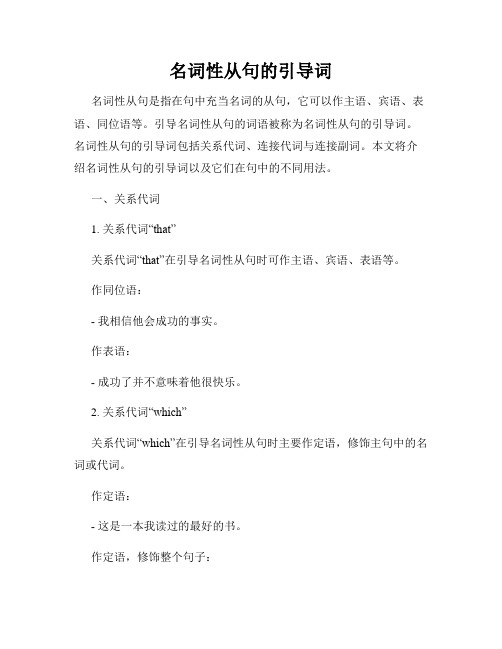
名词性从句的引导词名词性从句是指在句中充当名词的从句,它可以作主语、宾语、表语、同位语等。
引导名词性从句的词语被称为名词性从句的引导词。
名词性从句的引导词包括关系代词、连接代词与连接副词。
本文将介绍名词性从句的引导词以及它们在句中的不同用法。
一、关系代词1. 关系代词“that”关系代词“that”在引导名词性从句时可作主语、宾语、表语等。
作同位语:- 我相信他会成功的事实。
作表语:- 成功了并不意味着他很快乐。
2. 关系代词“which”关系代词“which”在引导名词性从句时主要作定语,修饰主句中的名词或代词。
作定语:- 这是一本我读过的最好的书。
作定语,修饰整个句子:- 她得到了自己一生中最珍贵的礼物,这让她非常感动。
3. 关系代词“who”关系代词“who”在引导名词性从句时主要作主语、宾语等。
作宾语:- 他遇到了一个非常有趣的人,他能和他聊天很开心。
作宾语补足语:- 她把奖品送给了那个帮助过她的人。
二、连接代词1. 连接代词“what”连接代词“what”在引导名词性从句时主要作主语、宾语等。
作主语:- 他们的关系到底是什么让他们走到了一起。
作宾语:- 我无法理解你表达的意思是什么。
2. 连接代词“whatever”连接代词“whatever”在引导名词性从句时主要作宾语、宾语补足语等。
作宾语:- 无论你做什么决定,我都会支持你。
作宾语补足语:- 我的决心是无论发生什么困难,都不放弃。
三、连接副词1. 连接副词“how”连接副词“how”在引导名词性从句时主要作宾语等。
作宾语:- 我不知道他是如何成功的。
2. 连接副词“when”连接副词“when”在引导名词性从句时主要作宾语等。
作宾语:- 我无法预测他们何时会来。
无论是关系代词、连接代词还是连接副词,它们在引导名词性从句时都充当特定的角色,使整个句子更加准确和流畅。
通过熟练掌握它们的用法,我们能够更好地理解和运用名词性从句,提升自己的写作和表达能力。
高中语法详解名词性从句的引导词

高中语法详解名词性从句的引导词名词性从句是由一个从属连词引导的,可以在复合句中担任名词的成分的从句。
引导名词性从句的从属连词主要有以下几种:关系代词、关系副词、连接代词、连接副词、连接词和其他从属连词。
本文将详细解析这些引导词在名词性从句中的用法和特点。
一、关系代词关系代词包括:that, which, who, whom, whose。
在名词性从句中,它们引导从句并在从句中充当名词的成分。
1. that“that”在名词性从句中用作主语、宾语或表语,并且在从句中作关系代词,指代先行词。
例句1: I believe that you can pass the exam.(作为宾语)例句2: This is the book that I bought last week.(作为定语)2. which“which”在名词性从句中用作主语、宾语或表语,并且在从句中作关系代词,指代先行词。
例句1: The building, which was built in 1900, is now a museum.(作为非限制性定语从句的一部分)例句2: I don't like the dress which you bought.(作为宾语)3. who/whom“who”用于人称名词,作为主语、宾语或表语。
当“who”在从句中作关系代词时,它的宾格形式是“whom”。
例句1: He is the man who helped me yesterday.(作为宾语)例句2: The girl to whom I spoke is my sister.(作为间接宾语)4. whose“whose”在名词性从句中用作定语修饰名词,并且在从句中作关系代词,表示所属关系。
例句: He is the boy whose father is a doctor.(作为定语)二、关系副词关系副词有:when, where, why。
- 1、下载文档前请自行甄别文档内容的完整性,平台不提供额外的编辑、内容补充、找答案等附加服务。
- 2、"仅部分预览"的文档,不可在线预览部分如存在完整性等问题,可反馈申请退款(可完整预览的文档不适用该条件!)。
- 3、如文档侵犯您的权益,请联系客服反馈,我们会尽快为您处理(人工客服工作时间:9:00-18:30)。
名词性从句引导词细辨主语从句、表语从句、宾语从句和同位语从句都属于名词性从句范畴。
引导这些从句的连词大体上相同,但是部分学生对其中某些连词之间的区别还不甚清楚。
此外连词之间的差异也一直是各类英语试题的命题热点。
本文就这些易错易混的连词谈谈它们的用法区别。
一、that,what和which1. that引导名词性从句时只起连接从句的作用,本身没有任何意义,因此在从句中不充当任何句子成分,它的使用须注意以下几点:A. 引导宾语从句时,that常可省略,但如果主句后跟有并列宾语从句时,只能省略第一个that;若宾语从句前插有别的从句时,that也不能省略。
例如:He told me (that) he was all right and that he would come to see me when he was free. 他告诉我说他很好,并说在他有空时来看我。
B. that引导主语从句位于句首时不可省略.如果it作形式主语,而that从句置于句末, 这时that可以省略。
例如:That he has lost his work is not true. 他丢了工作不是真的。
=It is not true (that) he has lost his work.C.当主语为the reason时,注意应用that 引导其表语从句,不能受汉语影响而误用because。
例如:The reason why he was late was that he missed the early bus. 他迟到的原因是他没赶上早班车.(此句中的that不可用because代替)D.引导同位语从句时,切不可错用which。
例如:Word has come that some American guests will come to visit our school next week. 有消息说下周将有一些美国客人来我校参观。
2. what与which引导名词性从句时都在从句中充当句子的某一成份,如主语、表语、宾语或定语,其区别是:what表示泛指的事物,常译为"什么"或" 所……的事物", whatever是它的强语势"无论什么";which表示特定事物中的"哪一个(些)",一般情况下在从句中充当定语,后接名词,在一定的语境中,它所修饰的名词可以省略,whichever是它的强语势"无论哪一个(些)"。
例如:I believe what (whatever) he says. 我相信他说的(不管他说什么我都相信)。
I will give her which (whichever) book she likes on the shelf. 这个书架上的(任何一本)书,只要她喜欢,我都会给她。
二、who,whoever,whom和whomever在引导名词性从句时,在句中作主语时用who,意思是"谁",含有疑问意味,whoever是它的强语势"无论谁",不含有疑问意味。
作宾语时用whom, 其相应强语势为whomever。
判别时要根据句意以及在句中的语法功能来决定该用哪个引导词。
例如:Who has taken away my bag is unknown.谁拿走了我的包还不知道。
(若用Whoever显然句意不通)Whoever wants to see this film can go with us tonight. 无论谁想看这部电影今晚可以和我们一起去.(Whoever wants 相当于Anybody who wants,意为"凡是想……的人"。
这里不可换为Who。
)Have you decided whom you are to nominate as your candidate? 你们是否已经决定提名谁作侯选人了?You can give the ticket to whomever you like. 你可以把票给任何你想给的人。
语法点滴“疑问词+不定式”用法小结一、"疑问词+不定式"的构成:由疑问代词who, whom, what, which; 疑问副词when, how, where等+不定式构成。
Choosing what to eat is no longer as easy as it once was. 选择吃什么,已经不像以前那么简单了。
How to describe people is today's topic. 如何描述人物是今天的话题。
二、"疑问词+不定式"的功能:在句中可作主语、宾语、表语等成分。
1.作主语How to give advice in English is what I am trying to learn. 我正在努力学习如何用英语提建议。
2.作宾语①作动词的宾语We have to start somewhere if we want to learn how to write plays. 我们要学习写剧本,总得有个开头。
②作介词的宾语We had better learn to make the right choices about what and how we eat. 我们最好能学会正确选择吃什么、怎么吃。
When you are trying to advise someone about what to do or what not to do, you can use should / ought to or should not /ought not to. 当你想要建议某人做什么或者不做什么时,你可以用should / ought to 或者 should not / ought not to。
3.作表语My question is where to find the answer. 我的问题是在哪里能找到答案。
三、"疑问词+不定式"的使用方法。
⒈ "疑问词+不定式"构成的短语在句中当"名词"用,可以写成相应的从句。
I am not sure how to behave at the dinner table. (= I am not sure how I should behave at the dinner table.) 对餐桌礼仪,我心中没底儿。
⒉ 这种结构中,疑问代词须接及物动词或相当于及物动词的短语(who, which除外)【误】 I don't know what to talk.【正】 I don't know what to talk about.但可以说:We haven't decided who (which) to go. 我们还没定谁(哪个)去。
⒊ 这种结构中的疑问副词后要接不及物动词;若接及物动词, 要有动词的宾语。
I don't know how to talk. 我不知如何谈。
I wonder if you could tell me how to do it. 不知您能否告诉我如何去做这件事。
(不能说: ... how to do.)语法点滴“疑问词+不定式”用法小结,嘉兴英语网收集整理,已有226人阅读本文常考英语语法十五要点一、动词时态及语态题(大家应该记住我所讲过的九种时态,特别是其中的过去完成,过去进行时,客观真理要用一般现在时等)1、The manager told us that this factory was built in 1958.2、By the time we got there, the play had already begun.3、When I was a child, I knew that the earth turns about its axis.4、When Mr.Delay got home after a day’s exha usting work, his wife and children were sleeping.二、非谓语动词题(特别是现在分词与过时分词的区别,大家一定要弄明白主动与被动这对最最重要的区别,要求大家多看我的上课笔记)1、The film showed last night was very moving. (不用moved,大家别忘了-ed形容词和-ing形容词的区别)2、Having finishing his lecture, the teacher asked if anyone wished to asked a question.3、The problem being discussed is very important.4、Given more time, we are sure to finish it.5、Will you please make yourself known to everyone here?三、 It作形式主语及形式宾语题(这也是一个常考点,it本身是没有意思的,注意it还可以指时间,天气等。
)1、It is difficult to study English well.2、We think it is important to pass the exam.四、强调句型(大家要记住的是it is (was)…….that….,如果前面是it is/was 后面往往选用that,当然强调人的时候也可用who)1、It was at an evening party that I first saw her.2、It is what you will do that is important.3、When was it that he bought a new car?五、倒装句型全部倒装句(这种全部倒装题历年只考过一次,考得最多的都是下面的部分倒装)1、Stop talking! There comes the teacher.部分倒装句(如果选项里面有两个主谓倒装了,两个没有,我们一般要在倒装里做选择)1、So badly was he hurt in the accident that he had to be sent to hospital.2、Not only does he study well, but also he is always ready to help others.3、Mary has done well in the English exam. So she has. She always does well in the exam.六、从句中选择关系词题(重点在定语从句,多看笔记, because/since/now that/as/for; so…that…/such… that…)1、It was in so friendly a way that he talked with us.2、Oct.15, 2005 is a day when we will take our English examination.3、We want to buy the same book as you are reading.4、The sun heats the earth, which is very important to living things.七、虚拟语气(我们要记住与现在,过去,将来相反的三种情况,特别是与过去相反的情况最常考,再有就是wish/as if 后面所接的三种情况,还有一个常考点在suggest,demand,require,order等表示建议,要求,命令的词后面加从句时,从句里谓语要用(should)+动词原形,如果是被动则用(should +be +动词过去分词)1、I would have done it better if I had had more time.2、I wish you would go with us tomorrow.3、I suggest that we (should )adopt a different policy.4、Had it not been for your help, we would never have been able to get over the difficulties.八、情态动词题(除了掌握常见情态动词基本用法外,常考点在三种表推测的情况,分别为must表对现在事情的肯定推测,can’t表对现在事实的否定推测, must have +v-ed表示对过去事实的肯定推测,而则表示过去应该做某事而没有做)1、The ground is so wet, it must have rained last night.2、She must be a doctor, I think.3、I should have called you last week, but I was too busy then.九、几组形容词及副词区别题(注意比较级、最高级、倍数表达; likely/possible/probable;worth/worthy; too much/much too; already/yet等)1、His books are three time as many as my books.2、The Nile river is the longest river in the world.3、It is much too hot tonight.4、The harder he worked, the happier he felt.十、主谓一致题(往往出题者都是考谓语动词选单数这种情况,如each,every,everyone这样的词作主语以及Mary, like many other girls likes listening to music这样的题)1、The moral of the officers and crew was very high.2、Each boy and each girl in the city is asked to go to school.3、Neither the quality nor the prices have changed.(近位原则)十一、动词及动词词组区别题(常考的有raise/rise/arise/arose; spend/cost/take/pay/afford; wound/injure/hurt/damage; find/findout/discover/invent; hit/strike/ring/beat;tell/say/speak/talk; join/join in/take part in等以及我所讲过的动词短语)1、Can you tell the difference between these two words?2、He joined the army three years ago.十二、主句用将来时,从句则用一般现在时(或现在完成时)表将来题1、They will leave the classroom when they have finished writing.2、We will start to work as soon as our teacher comes.十三、名词所有格以及名词后面有限定时则该名词前一定要加定冠词the题(名词的格有以下两种情况,Tom’book, 以及 the books of our school,特别是用of表示的所有格我们一定要习惯这种表达)1、Beijing is the capital of China.2、H e can’t have the expience of all of the world.十四、常用介词区别题(如on, in, except /besides, within, without, through等)1、You should write in ink not with your pencil.2、He pulled her into the train by the arm.3、by bus/train/air…. On foot, on the farm, in the mo rning/afternoon/evening, at night/noon十五、常考代词题(常考的有other/others, another/the other; sometimes/some time/sometime; that/which; that/what, either/neither/or; too/also/either; many/much/a great deal of/a great number of/a great amount of; a few/few/little/a little; as long as/as far as; so long as/so far as )1、That you don’t like him is none of my business.2、The weather in the north is much colder than that in the south in January.3、He must be a worker. I think so.四组名词性从句引导词用法区别1. what 与that的用法区别两者均可引导主语、表语、宾语从句,区别是what可在从句中用作主语、宾语或表语,意为“什么”或“所…的”,而that仅起连接作用,本身没有实际意义,在从句中也不充当任何句子成分(引导宾语从句时通常可以省略):He doesn’t know what she likes. 他不知道她喜欢什么。
